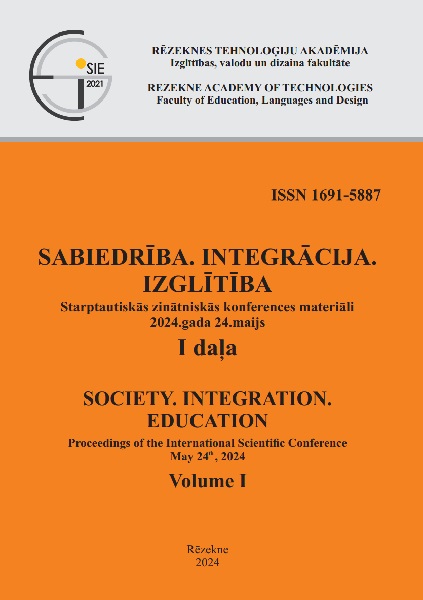THE IMPORTANCE OF THE REALISATION OF THE RIGHT OF THE CHILD TO PARTICIPATE IN CHILDREN’S DAY CARE CENTRES
DOI:
https://doi.org/10.17770/sie2024vol1.7787Keywords:
child, day care centres, participation, rightAbstract
The aim of the study is to reveal the importance of the realisation of the right of the child to participate in children’s day care centres based on the experience of social pedagogues and social workers. Qualitative research was chosen for the study by using the method of semi-structured interview. 11 employees, who work in children’s day care centres in different Lithuanian regions, participated in the study. The study revealed the importance of the implementation of the right of the child to participate to the child, employees, the quality of provided socio-educational services and the continuity of the implementation of this right when cooperating with the family of the child successfully. The importance to the child should be associated with the strengthening of his/her dignity, self-esteem, self-confidence, the ensuring of his better well-being and emotional security; the self-realisation of the child, his/her problem solving, communication, cooperation, activity planning and organizational skills improve, the child develops responsibility and autonomy when taking and realising decisions. The importance to employees should be associated with the better knowledge of the child and understanding of his/her situation, satisfaction of his/her needs, the formation of the relationship with the child based on cooperation. The importance to the quality of provided services should be associated with activities, which meet the needs of the child, the guarantee of a favourable socio-educational environment in children’s day care centres, the opportunity for the child to influence the planning and organization of activities in children’s day care centres. The cooperation with the family of the child guarantees the continuity of the implementation of the right of the child to participate, because parents understand the importance of this right to the well-being of the child and create possibilities for its implementation.References
Aldgate J, & Statham J. (2001). The Children Act Now: Messages from research, London, The Stationery Office.
Aluwihare-Samaranayake, D. (2012). Ethics in qualitative research: A view of the participants' and researchers' world from a critical standpoint. International Journal of Qualitative Methods, 11(2), 64-81. DOI: 10.1177/160940691201100208
Bessell, S. (2011). Participation in decision-making in out-of-home care in Australia: What do young people say? Children & Youth Services Review, 33(4), 496–501. DOI: https://doi.org/10.1016/j.childyouth.2010.05.006
Brummelaar M. D. C., Harder A. T., Kalverboer M. E., Post W. J., & Knorth E. J. (2018). Participation of youth in decision-making procedures during residential care: A narrative review. Child & Family Social Work, 23(1), 33-44. DOI: https://doi.org/10.1111/cfs.12381
Creswell, J. W. (2014). Research design: Qualitative, Quantitative and mixed methods approaches. London, Sage.
Gudžinskienė, V., Raudeliūnaitė, R., & Uscila, R. (2016). Vaiko teisių įgyvendinimo galimybės vaikų dienos centruose. Pedagogika, 121(1), 209–224. DOI: https://doi.org/10.15823/p.2016.15
Heimer, M., Näsman, E., & Palme, J. (2018). Vulnerable children's rights to participation, protection, and provision: The process of defining the problem in Swedish child and family welfare. Child & Family Social Work, 23(2), 316-323. DOI: 10.1111/cfs.12424
Henagham, M. (2017). Article 12 of the UN Convention on the Rights of Children. The International Journal of Children’s Rights, 25(2), 537–552. DOI: doi.org/10.1163/15718182-02502012
Herbots, K., & Put, J. (2015). The Participation Disc: A Concept Analysis of (a) Child (’s Right to) Participation. DOI: 10.1163/15718182-02301007
Lansdown, G., Jimerson, S. R., & Shahroozi, R. (2014). Children’s rights and school psychology: Children’s right to participation. Journal of School Psychology, 52(1), 3–12. DOI: doi.org/10.1016/j.jsp.2013.12.006
Manful, E., & McCrystal, P. (2010). Conceptualisation of Children's Rights: What Do Child Care Professionals in Northern Ireland Say? Child Care in Practice, 16(1), 83-97. DOI:10.1080/13575270903381744
O’Hare, L., Santin, O., Winter, K., & McGuinness, C. (2016). The reliability and validity of a child and adolescent participation in decision-making questionnaire. Child: Care, Health and Development, 42(5), 692–698. DOI: 10.1111/cch.12369
Olsen, R. K. (2022). Now I Understand why She Needs Our help: A Qualitative Case Study on Collaborative Alliances with Children in Research. The International Journal of Children's Rights, 30(4), 990-1020. DOI: 10.1163/15718182-30040007
Palmer, S., Maiter, S., & Manji, S. (2006). Effective intervention in child protective services: Learning from parents. Children and Youth Services Review, 28(7), 812–824. https://doi.org/10.1016/j.childyouth.2005.08.010
Saracostti, M., Caro, P., Grau, M. O., Kinkead, A. P., & Vatter, N. (2015). El derecho de participación en la niñez: alcances y desafíospara la investigación social. (2015). Revista del CLAD Reforma y Democracia, 62, 215-244. Retrieved from: https://www.researchgate.net/publication/283518429_The_Right_of_Children_to_Participate_Scopes_and_Challenges_for_Social_Research
Skauge, B., Storhaug, A. S., & Marthinsen, R. (2021). The what, why and how of child participation – a review of the conceptualization of “child participation” in child welfare, Social Sciences, 10(2), 54, 2021.DOI: https://doi.org/10.3390/socsci10020054
United Nations. (1989). Convention on the Rights of the Child. Retrieved from: https://www.ohchr.org/en/instruments-mechanisms/instruments/convention-rights-child
Vis, S. A., Strandbu, A., Holtan, A., & Thomas, N. (2011). Participation and health – a research review of child participation in planning and decision-making. Child & Family Social Work, 16(3), 325–335. DOI: https://doi.org/10.1111/j.1365-2206.2010.00743.x.
Woodman, E., Roche, S., & McArthur, M. (2023). Children's participation in child protection—How do practitioners understand children's participation in practice? Child and Family Social Work. 28(1), pp. 125-135. DOI: https://doi.org/10.1111/cfs.12947
Žydžiūnaitė, V., & Sabaliauskas, S. (2017). Kokybiniai tyrimai. Principai ir metodai. Vilnius, Vaga.






